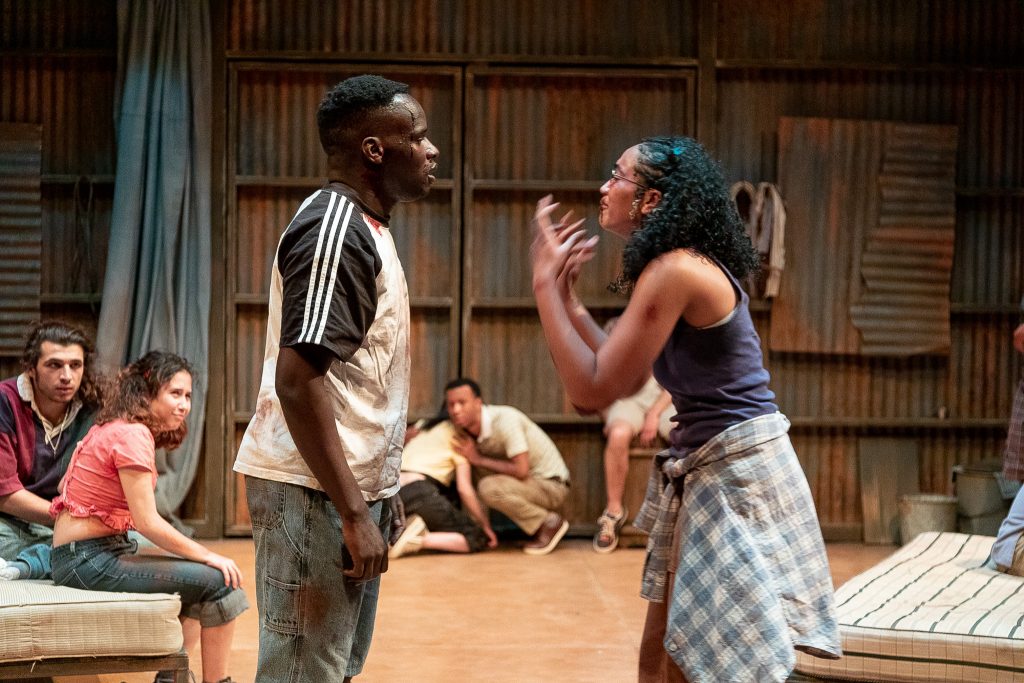The opening night of “Envoy” in Fine Arts Studio A successfully brought a community of students and staff together to experience and watch something completely human. Immersing the audience in a third world country, Brandon Wright, director of the production and assistant professor of acting and directing, shares an emotional story of students held hostage in a deep and meaningful way.
“Envoy” tells the story of a group of American students who have been captured and held hostage on an abroad mission trip. This leads each of the students to reflect on their decisions, beliefs and what it truly means to be human and alive.
The atmosphere of the black box theater gives audience members the chance to feel like they are in the play itself. This can be felt and seen in the very beginning when the audience is introduced to each one of the students and their relationships with each other. The fourth wall is broken as the characters in the play begin to interact with the audience by handing out pamphlets. This connection is vital because when the characters get captured and put into a singular room, the audience can sympathize with them and understand the choices that they make throughout the play.
The different characters and the interactions that they have with each other shape the play and make it what it is by showing pure human interactions. Each character has a distinct quality that adds to the show like Judith and her religious views, Peter and his anger and Jamie’s motherly qualities.
The first moment the audience truly feels for the characters is when Peter and Jamie — the older “leaders” of the group — come back from trying to negotiate with their captors. Before this, the group fights among each other about their beliefs and changing views after being held hostage for around eight hours — but the second Peter and Jamie come back, everything changes. The group starts to debate about what has to be done to get out or not get out at all. It brings the audience on an emotional rollercoaster.
The sound effects in the show and the lighting also add to the intensity of the play. The audience can feel the emotions that come with being held hostage. The flashing lights, loud banging sounds and intense music elevate the immersive quality of the play.
The play acknowledges topics that can be related to the real world and touch many people. It has a political aspect, leading to many characters talking about America and its system. The characters go into depth about religion and everyone’s different views on God, the Bible, verses and varying values.
Ava Rongo, a freshman majoring in mathematical sciences, believes that the show talks about these topics of religion, politics and patriotism in an engaging manner.
“There was some poking fun at patriotism which I found comical, but I also thought it was very interesting because it’s obviously very political,” Rongo said. “The same sort of idea with the Christianity mentioned.”
Aside from this very political and religious aspect of the play, there is a very universal human experience that comes from watching it.
Wright describes how he wanted to touch on the human condition and get the audience to connect to the show in a long-lasting manner.
“On a deeper level, at its core, this play is about people,” Wright said. “It’s about stripping back the layers we put on as we navigate the world and seeing what really unites us in our human experience.”
Wright went on to describe the influence he hopes the play has.
“I hope our audiences leave with new eyes,” Wright said. “A desire to see past what we ‘see’ and experience people for more of who they are.”
The play is an ensemble, with all the characters having a good amount of dialogue and action. This creates a new experience for the actors of Binghamton University and allows them to learn and try new things.
Linda Chen, an actor in the play and a senior majoring in theatre, describes what the show did for her and how she approached playing her character.
“This show gives me a chance to hold responsibility as an actor and what it takes to be and maintain that actor self,” Chen said. “I focused on where bruises and dirt marks landed on me and made them apparent. Breath was also something I considered, especially during intense moments.”
As a play, “Envoy” ultimately affects both actors and audience members. For its opening night, the show was perfect and connected and affected all. The department of theatre, director and all actors involved created a community with this show by illustrating an utterly human experience.



